Amid the high-profile controversies and political maneuverings that often dominate the landscape of government agencies, the Department of Science and Technology (DOST) has adeptly avoided such distractions. Instead, it has remained steadfast in its core mission of advancing science and technology for the nation’s development.
To the best of my recollection, the DOST has always maintained a low profile, prioritizing its mission over media attention. During my tenure as a close-in writer for the late President Fidel V. Ramos in the early to mid-90s, I recall its then secretary, Dr. Ricardo Gloria, being as quiet and low key as the department he led. This was also true for his successor, Dr. William Padolina.
Even when I was with the private sector, I can’t recall any major controversies involving the DOST and its agencies over the past two decades. Their annual budget under the General Appropriations Act (GAA) has consistently avoided significant cuts, reflecting the high level of credibility and trust they enjoy from both Congress and the public.
Operating away from controversies has allowed the DOST to work effectively, dedicating its efforts to research and development that yield tangible benefits for the Filipino people. This year, the department has a proposed budget of P28.45 billion (vs. P26.73 billion for 2024) under the National Expenditure Program (NEP) submitted by the Department of Budget and Management (DBM) to Congress.
The proposed budget will enable the DOST to expand its research, support more innovative projects, and ultimately, contribute to a more resilient and competitive nation, said DOST Secretary Renato Solidum, Jr.
One of the shining examples of DOST’s projects is the Startup Grant Fund (SGF) program, which serves as a beacon of hope for budding entrepreneurs and innovators, providing them with the necessary support to translate early-stage technologies into market-ready products.
The SGF program, aligned with the Innovative Startup Act, empowers technology-based startups to overcome research and development (R&D) roadblocks, strengthen intellectual property, establish market traction, and refine business models. It’s a clear indicator of how the DOST is not only fostering a culture of innovation but also ensuring that R&D translate into real-world applications and economic growth.
Recently, the DOST unveiled three technologies developed by start-up Filipino-owned companies under its SGF Program. One of these innovations is the Recycle On-Demand Bin (ROBIN), created by Robin Machine Manufacturing. This “reverse vendo system” collects recyclable items in exchange for rewards such as cash, WiFi access, charging ports, or points redeemable with partner retailers.
Another technology is the cassava bioplastic developed by SACHI Group Inc., which focuses on enhancing and reducing the manufacturing costs of cassava-based bioplastics. The third project is roofing tiles made from waste single-use plastics, developed by Lesstics Inc.
The three technologies aim to mitigate the effects of plastic waste in the Philippines, addressing concerns about the country’s high incidence of microplastic ingestion.
“We at DOST continue to provide solutions and open opportunities for our industries as we move towards strengthening our circular economy. Through R&D, startups can bring transformative innovations and solutions to national concerns,” said DOST Secretary Dr. Renato Solidum Jr.
The DOST chief said he is looking forward to make these technologies become publicly available and fully utilized by the citizenry. The PHP 5 million per startup grant is funded through the department’s annual budget.
In the next few weeks, both Houses of Congress will tackle separately the department budget.
I do not see any reason why both the House of Representatives and the Senate won’t approve the requested P28.45 billion budget, which is P1.72 billion higher than this year’s allocation.
There is even a possibility that the DOST can get additional funding since there were calls to increase the budget to ensure that PHIVOLCS and PAGASA can continue their crucial work in monitoring natural hazards and providing weather forecasts.




